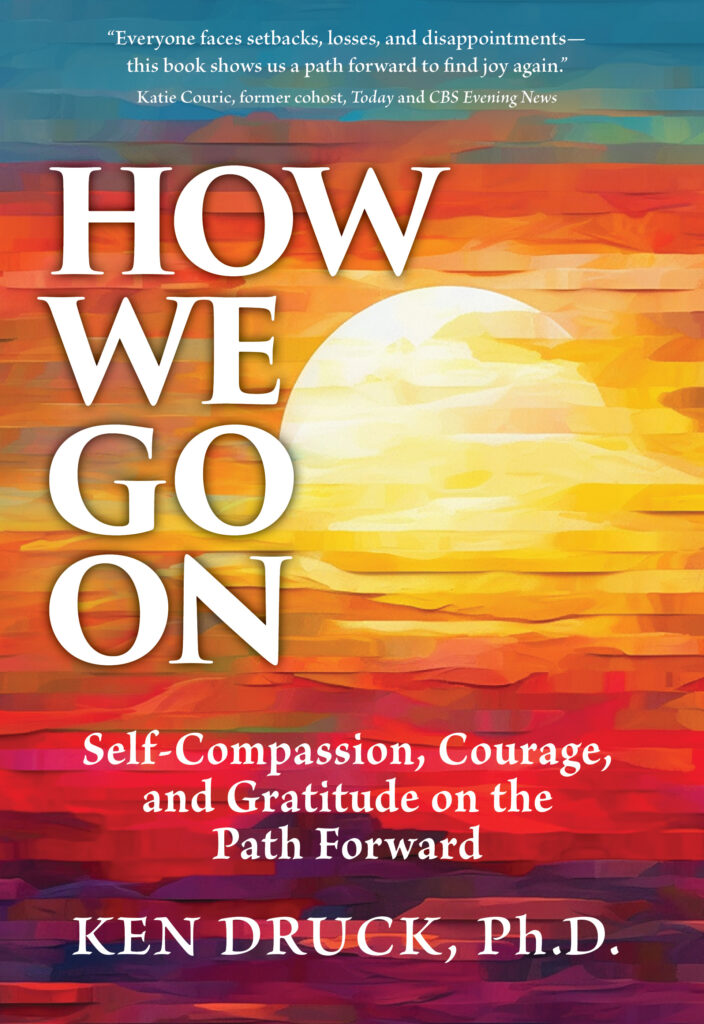One of the most difficult challenges of running grief support groups and workshops at The Jenna Druck Foundation was creating and maintaining it as a “Judgment-Free Zone.” Careful to catch ourselves judging each other’s approach to surviving the death of a child as “weak,” “ineffective,” “too spiritual or religious,” “not spiritual enough,” or in some way “less than,” we learned to listen more than talk. We also learned to apologize to one another for saying something self-righteous, insensitive, or thoughtlessly stupid.
Some of us made the mistake of saying or doing something stupid to another person who had suffered a loss, such as comparing our loss to theirs. There are countless horror stories about things that should never have been said or done in the name of supporting the bereaved. One set of parents who shared what it was like to bring their little boy to the City of Hope, a cancer center outside Los Angeles, for a year and a half, only to have to say goodbye to him was told, “You’re lucky. My daughter died in a car accident, and I didn’t get to say goodbye to her.” Or the grandkids in New Jersey whose grandmother in Israel had just been kidnapped by Hammas and were told, “Well, it’s your fault for killing Palestinians’ rather consoled, supported or extended a moment of sympathy by their classmates,
Then there are the things we say to ourselves that are fraught with misplaced blame. We use “if onlys” to implicate ourselves in the deaths of our loved ones. A dad who lost his son to suicide proclaims, “If only I had kept that gun under lock and key, he’d still be here.” A wife who goes up to bed after watching The Late Show with Stephen Colbert finds her deceased husband on the bathroom floor of their bedroom. Add to this the if onlys of a mom who accidentally backs out of her driveway, running over her three-year-old son, a dad who drops his seven-year-old son off at Sandy Hook Elementary School where a gunman shoots him to death a few short hours later, another dad (me) who sends his twenty-one-year-old daughter on a study-abroad program not knowing her flight from Mumbai to Agra has been overbooked and that she’s going to die in a bus accident on her way to the Taj Mahal. These parents all made innocent decisions they would spend the rest of their lives questioning and regretting.
If onlys are, in part, the mind’s endless effort to undo a loss by considering every conceivable way we could and should have prevented it. We think about what happened and magically try to change the details that led to their deaths. Doing this can lead us right into conducting imaginary trials, irrationally blaming, prosecuting, and punishing ourselves for their deaths. Trying to disarm a bereaved person who is intent on taking the blame for somebody’s death is too often a futile gesture. As we’ve said before, only they can stop themselves from endless visits to the Torture Chamber of Guilt, where they wrongfully prosecute, convict, and punish themselves.
Other items on the list of bad long-term options for trying to dull the pain of loss include drinking, drug abuse, crawling into a dark hole, or seeking revenge. The bereaved might also try to deny that the loss is real, fabricate a story about the death, drown themselves in work, or distract themselves by watching TV, gambling, hoarding, or playing video games. I must admit, there were days after my daughter Jenna’s death when all I could do was stay in bed, watch mindless TV, snack on Devil Dogs, and cry.
It made more sense, in the long run, for me to learn some good options: to allow myself to slowly come to terms with what had happened, give myself permission to grieve, learn to speak kindly and patiently to myself instead of critically and with blame, and stay open to how my life might possibly be able to go on. Things like going for a long Forest Gump walk, easing my way back to work, eating well, and allowing myself to receive the love and support of my family, friends, and coworkers were all important.
Most importantly perhaps, I began assuring myself, “It’s okay to feel lost, broken, empty, scared, and angry, and to not have everything figured out.” I pushed back from people who could not be understanding and supportive and surrounded myself with those who could offer encouragement and kindness, expecting nothing in turn. With caring family members, friends, colleagues, and both my Angel Daughter, Jenna, and my Earth Daughter, Stefie, by my side, I tried to find my way through this unspeakable darkness. I slowly learned how go on with a hole in my heart and the permission to proceed on my own terms.
It’s also important to mention that the heart-wrenching losses of our lives are, in some ways, precursors to dealing with our own death, especially as we get older. More about this in the final chapter of my How We Go On book, when I introduce my “Moon Shot” for making peace with death.
Another important part of the healing process, for me and for the countless people I have helped, is being reminded and encouraged to acknowledge the progress we have made. We can so easily forget, or take for granted, all that we have been doing to fight our way back into life. It’s one thing to thank ourselves for the times we’ve said, “Yes,” “No,” and “Maybe later!” and another to be constantly apologizing and criticizing ourselves for not having done enough. Having gunslingers in our lives who don’t know the first thing about grief telling us to “suck it up” or to “get closure” is less than useless; it is harmful. Commending ourselves for the courage, faith, patience, permission, and self-compassion we have given ourselves to go on strengthens us on the path forward.
It’s perfectly natural and normal for us to be triggered and feel sad over the course of time. It doesn’t mean we are weak, have failed at grieving, and should be put on the sale rack. It just means that we’re human. Getting triggered and feeling some of the same things we felt in the beginning, when grief was fresh, is what humans go through after suffering a traumatic loss. In almost all cases, we will not have to spend prolonged periods in the kind of darkness we experienced during the first seasons of loss. Having learned a thing or two about allowing our grief to wash over us, remembering that we have the strength to breathe through and manage a recurrence of sorrow, and knowing how to listen to, soothe, and reassure our hearts when triggered or retraumatized, we are ready to go on, again.
If you or someone you know is going through a painful loss, here are Some Dos and Don’ts of Grief Support, taken from one of my handouts, to guide you.
A FEW DOS
- Give your condolences. A simple, sincere “I’m so sorry for your loss,” a soft hand on the shoulder, or a caring hug are usually perfect.
- Stay in touch, even when others begin to disappear.
- Show you genuinely care through kind words and actions. Tears are also an okay way to show you care.
- Allow them to grieve without fear of being judged, analyzed, fixed, cured, saved, or healed.
- Listen patiently and ask open-ended questions to see how they’re doing and what they need.
- Suggest a few things you’d like to do to help. Listen intently and do what they ask.
- Give them every opportunity to talk about the person who died, telling stories about their life and special qualities they possessed.
- When they bring up the loss, respond in a way that shows them you’re listening, you get it, and you genuinely care.
- Check your ego at the door and be of service by showing genuine concern, kindness, understanding, patience, empathy, and compassion.
- Stay humble, flexible, relaxed, and at ease to the best of your ability when you’re with them.
- Assist them in getting the support they need, including professional help from a counselor, coach, or psychiatrist if necessary.
- Gently encourage them to ease their way back into their new or old normal, including daily activities, routines, work, and relationships. Taking a leave of absence or a sabbatical may be necessary.
- Set up a “back up” or “buddy” system in case they need time to step back and grieve their loss.
- Invite them—without the least bit of pressure—to join you for lunch, coffee, or a walk.
A FEW DON’TS
- Don’t assume, or tell them, that you know how they feel or what they want. This is true even if you have gone through a loss yourself. Everyone grieves differently.
- Don’t put a psychological, religious, or spiritual spin on their loss. Never tell them a tragedy was God’s plan.
- Don’t use “Just be positive” or “glass is half-full” clichés. Refrain from anything that might be construed as a “hurry up,” “you’ll get over it,” “time heals all wounds” message.
- Don’t give unsolicited advice or play shrink with them.
- Don’t try to compare your loss to theirs.
- Don’t suggest a quick-fix “Let’s go to Vegas” solution to take away their pain.
- Don’t take it personally if they don’t respond to you the way you had hoped—and get “an attitude.” Life as they knew it just ended! It’s not about you!
- Don’t allow your own feelings of helplessness, impatience, or intolerance of their persisting sorrow to cause you to say something stupid, insensitive, or rash.
- Don’t ask how they’re doing, or any other casual question, unless you’re prepared and qualified to listen.
- Don’t control the conversation. Let them take the lead on what they want to talk about, and ask respectful, open-ended questions to draw them out.
- Don’t avoid, gloss over, act cute, change the subject, resort to small talk, or pretend nothing has happened.
- Don’t smother them with caregiving attention. They need time to breathe, take breaks, and come up for air.
- Don’t in any way encourage them to hide, deny, repress, avoid, displace, dumb down, or “medicate” the sorrow, anger, or guilt they are feeling and that may have been triggered by something.
- Don’t make executive decisions without consulting them. Ask them what they’d like to have happen.
Compassion, Support, and Understanding
When I’ve asked people who are dealing with a loss what topped their list of “helpful, encouraging, and supportive things people said to me,” here are a few things they told me:
- I am so sorry for your loss!
- It’s okay not to have all the answers or a clear direction forward right now.
- It’s normal to feel lost, empty, sad, and scared. How could you not?
- Take all the time you need to catch your breath and figure out what you want.
- It’s okay for you to strenuously object to what happened, asking, “How could God let this happen? This is not okay!” and demand to speak with the casting director or someone in customer service.
- Please let me know how I can support you right now, later today, tomorrow, and in the days to come.
- Remove your foot from your throat and remind yourself that it’s okay not to have it all figured out. In time, and with patience, you will begin to understand more about how you want to go on. And you will!

Excerpted from How We Go On: Self-Compassion, Courage and Gratitude on the Path Forward, Druck Enterprises Inc. Publishing, September 3, 2023


